
 |
||
|
|
||
|
| ||
|
|
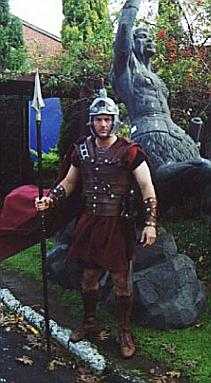 | 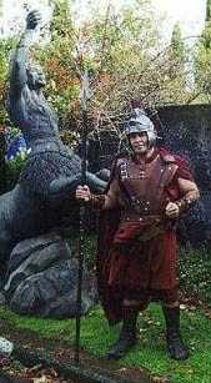 |
I decided that, since they are such familiar faces that even I recognised them, and since so many people have been interviewed on the Internet but not, so far as I know, any regular actor/stunties, I'd try my hand at interviewing them. Never having interviewed anybody before, I was somewhat nervous about asking, but I reasoned that, as actors, they would be willing to talk about their work. What follows is from my furiously scribbled notes, aided by my memory.

The first Roman guard I approached was Albert Rounds Heimuli, a well-built 'soldier' who I would not care to confront on a battlefield - I could just imagine a legion of him conquering Britain - but his frankness and amiability soon put me at my ease. He cheerfully posed for a photo, as he did for a number of auction-goers.
Albert was amused that he had, just a short while before, been approached by a foreign-sounding lady: "I've seen you a lot of times" "Where?" "On Spanish television". The extent of worldwide XENA coverage surprises even those who work on the show.
I commented that I'd seen him just a few days before, in Ides of March, rushing in to kill Xena as she lay helpless on the ground, with a truly ferocious expression on his face. He was the first victim of Gabrielle's killing spree. I asked if that was acted with doubles, and he said the fighting was Lucy and Renee, filmed by the main unit, the 'Xena' lying on the ground was a second unit stunt double.
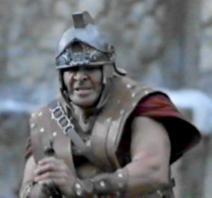
Albert saw himself in that episode, and the first thing he noticed on screen was that he'd put on a lot of weight. This was due to the good set catering food; much of the time on set was spent standing around waiting, which was tiring and made people hungry, but didn't afford any exercise; and at the end of the very long day he would be too tired to do anything but go to bed.
I asked Albert how many episodes he'd been in, but this was not easy to answer; he's acted in Hercules, Xena, Young Hercules, Amazon High, Cleo 2525 and Jack of All Trades - every Pacific Renaissance series. He has worked on Renaissance productions full-time for six years; he's played every sort of baddie, plus Romans, Asians and many other ethnic groups . His looks suit him for it. I commented that he looks perfect for a Roman soldier, possibly a mercenary from one of the Roman occupied territories; Albert said he'd often been told that. The Roman costume is quite comfortable to wear, and he's well used to it after wearing it on frequent occasions for the last six years. Other costumes have been much less comfortable.
Before Hercules, Albert was into amateur acting, when an actor friend suggested stunting as fulltime work. Stunting, on PacRen productions, includes acting, including delivering the occasional one-liner; he recalls being the leader of the villains on one occasion, delivering a line before being beaten up by Hercules or Xena. He has usually played villains, and has been killed numerous times; in most of his appearances he has been knocked about or beaten up by Xena, Hercules or the hero of the day.
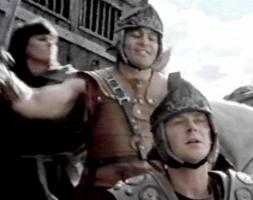
Albert made the point that, though the public don't appreciate the difference, he is a stuntie not an extra; collecting the spear from Gabrielle on Ides was stunt work, for example.
He has been in many fight scenes with Lucy, Renee, and others; they would rehearse the fight scenes with them first, then play it for real with the cameras rolling. Occasionally, stunties get hit accidentally; the rehearsal should allow them to avoid this, but sometimes mistakes happen.
Lucy, Renee, Kevin Sorbo, Kevin Smith, and Bruce Campbell are all good to work with; they know what they're doing and very rarely hit the stuntie by mistake. Some guest actors are a bit uncoordinated and need to rehearse the moves over and over; others are much better.
Albert has done 'high falls' on Xena and Hercules; that is, falling off the top of a castle or a tower, to land on an airbag. It's vital to land properly, usually on the back, and the stuntie has to judge his fall so he lands in the right position; landing feet-first could cause serious injury.
Another very tricky stunt is falling off horses; the stuntie has to hit the mark, right in front of the camera, so the camera can follow him down to the ground. This needs good timing and, preferably, a well-trained horse; not all horses are good, and sometimes it's a matter of luck which one the stuntie gets. There's no airbag to land on either; the stuntie has padded clothing - shoulders, elbows, back and knees - but he has to deal with the ground as best he can. Sometimes it's possible to spread some loose sand on the ground to soften it up.

Most of Albert's work has been at Lion Park [Pacific Renaissance's permanent outdoor sets], but he has also been to most of the other locations. The stunties would have to get up before 5 a.m., to be on set in time to get dressed and made up. On occasion, when there were crowds of extras, the day would start even earlier. Occasionally, the stunties would be released early if their parts were finished, but frequently it would be getting dark by the time they got home; it made for a long day.
Now that it's over, Albert is hoping to get more stunt or acting work. The last 5 or 6 years have been a great experience, meeting interesting people and working for different directors. Hopefully, he will be able to find an opportunity like that again.
Albert's last memory of the show is special to him; it was the final episode, directed by Rob Tapert himself, a night shoot on the final day of shooting, and Rob turned to Albert and the other stuntie present and said "Do you realise you're in the very last shot of Xena?". Albert counts it as an honour to have been there, at the very end, working under the direction of Rob Tapert.
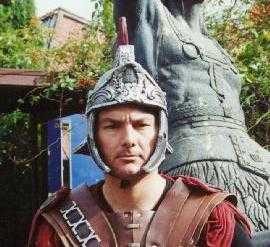
At this point, the other guard joined us, and Albert introduced him as Campbell Rousselle. Campbell is a stuntie and actor, and has worked on all the Pacific Renaissance productions, most recently Jack of All Trades, on which he has had a lot of stunt work and some speaking parts. At first the 'interview' was a bit hesitant, as the inexperienced interviewer (me) couldn't think of any intelligent questions to ask, but as soon as the topic of his work came up, Campbell's obvious enthusiasm made any further questions unnecessary; all I had to do was write.
Campbell has been stunting virtually fulltime for eight years; three days a week for forty weeks a year on average. Before that he was a 'struggling actor'. He tried to get to work with Peter Bell [Hercules and Xena stunt co-ordinator] several years earlier, but there was not much going at the time. Later he met Peter Bell as an actor on the NZ television series 'Plainclothes' and got into stunts that way.
Campbell's first work for Pacific Renaissance was late in the first season of the Hercules TV series; he got the part through New Zealand Stunts, and recalls that it was to do with gladiatorial sports, and had Ian Mune in it [it was in fact Gladiator]. Shortly after that he had a speaking part, through his acting agent; this was, he recalls, the end of the first teleseries; he was hassling Herc and was promptly bashed up by Xena. [Campbell's memory is correct; this was Unchained Heart. Xena ambushed him from behind.]
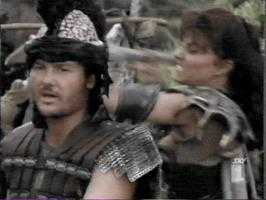
When the Hercules series first started, stunt work was very heavy work; they would typically go through three takes of a fight, from at least three angles for each take. With these, plus of course the rehearsals beforehand, Campbell sometimes did as many as 50 backfalls in one day. "Each of those takes it out of you, no matter how fit you are"; "I would end up totally exhausted".
Later on, things got easier; they had more stunties, and there would be a separate man for each move. And as everyone learned to do their jobs better (camera, stunts, props, special effects) and became more accommodating, fewer takes would be needed, from fewer angles, and anything missed on the main unit could be filled in by the second unit doubles.
Campbell said (quite unprompted by the interviewer) that working with Lucy Lawless, Renee O'Connor, Kevin Sorbo, and all the leads on Hercules and Xena was always a pleasure.
He would always try to get into Bruce Campbell and Renee's fights because he enjoyed working with them so much. Bruce was incredibly funny, and Renee had such amazing energy.

Kevin Sorbo liked stunties and treated them extra well; on occasion, when it was apparent that they would not be needed again that day, Kevin would ask for the stunties to be released to go home (the stunties would have considered it unprofessional to ask themselves). If on some occasions there weren't enough crew gifts to go around, Kevin would buy the extra ones out of his own pocket. And at the Hercules wrap party, Kevin specially thanked all the stunties, and emphasised that the action made the show.
Lucy Lawless is an extremely versatile actor who can do serious and comedy roles equally well. Campbell commented that, on set, she doesn't appear to be doing very much acting, but the results on screen are intense. Similarly, Kevin Sorbo appears to be effortless on set, but comes over very dynamic on screen. With some other actors the opposite happens; they look good live on set, but it doesn't translate well to film. Campbell found this interesting to see and valuable for his own craft as an actor.
He noted that the same applies to stunts; sometimes a stunt that feels great looks quite unspectacular on screen; at other times it's the other way around. However, "you know you've done a good job when you're lying on the ground and half the crew walk up and ask if you're okay - and you are."
Considering the huge volume of stunts, there have been very few injuries. The last shot of the day, when everyone was tired and in a hurry, would carry a greater risk of injury, usually from hand-to-hand fighting in the background. But in eight years, Campbell has only suffered minor cuts and abrasions and bruising, and the odd pulled muscle. He was known as a 'hard man', he could take punishment and get up and keep going; where others were more athletic, he was more resilient.
Campbell liked any change in work from the normal fights; he particularly liked doing stair falls. For these, the stuntie is padded up, and he must just relax and 'go with it', trying not to make it look too controlled, as this shows up on camera and appears contrived.
Peter Bell [the stunt co-ordinator] is very satisfying to work with - though very hard to please, and setting very high standards. This which puts the stunties under pressure to do it right, but is rewarding as they know the standard is so high. "I understand Peter from the perspective that I'm a perfectionist too".
Most fighting in the background is hand-to-hand, for visual and safety reasons. Swords and swordfights are visually limited - they take up a lot of room and are not very visible in the background. Hand-to-hand fighting, or using 'weapons' such as chairs, jugs, rakes and so on, is much more visible, and also far safer in a crowd; if sword-fighting in a crowd, it is all too easy to hit someone on the backswing [Campbell demonstrates a good backswing] if they stumble into your area. Also, a crowd fight, even if carefully choreographed, will very quickly become confused, in about three moves. Lord of the Rings was much more demanding in that area; more stunties, more extras, more unforgiving costumes and weapons, and much closer proximity; altogether much more risky.
Swords are usually reserved for the actors in the foreground. The very soft rubber swords are reserved for lead fights when necessary for safety; stunties fight with the hard rubber or plastic swords. These are as heavy as real steel swords, and typically less well balanced and more unweildy.
The lead actors were very good at not hitting the stunties; guest actors ranged from very good to very bad in that respect. With guests, the key was not physical ability, but their attitude - any guests who kept whacking the stunties under the impression it didn't matter were annoying and very frustrating to work with. Guests who made an effort (even if they sometimes hit a stuntie by mistake and apologised) and treated the stunties as people, not punchbags, were always enjoyable to work with. Some guests would be very nervous, especially if they hit the stuntie, and it was part of the stuntie's job to reassure the actor and rebuild their confidence.
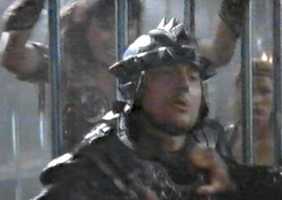
Good guests that Campbell particularly singled out were Hudson Leick, Bruce Campbell and Ted Raimi.
Hudson was very funny, extremely sensitive, artistic, but also down-to-earth. (Campbell was carefully trying to find the right words to convey her personality). She has, in Campbell's own words, an inner charismatic beauty. [I commented that this appeal of hers comes across on screen too].
Bruce Campbell (as Autolycus) was another of Campbell's favourite guest stars. Campbell just 'bounced off Bruce really well'. "Bruce just draws you into whatever it is that he's doing".
"Ted Raimi is so cool. Off set, he is hysterically funny, on set he is a talented actor. In SeaQuest DSV he had a very straight, serious role; Joxer is quite the opposite, dorky but lovable. It's a lot of fun to be on the set with him."
"The best thing about all the big stars [on Herc and Xena] is that they're so down-to-earth, they always had time to say 'Hi' and be genuine people."
Now all the series have finished, Campbell is looking for future acting opportunities. It's a bit scary, and a bit sad, but an opportunity to pursue acting in a much more aggressive fashion. Campbell views the end with mixed emotions; eight years is a long time to do the same thing and, as he puts it, his body doesn't bounce so well when he throws himself on the ground.
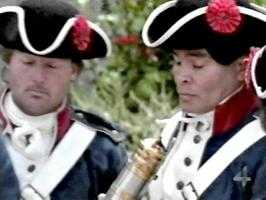
Talking to these two actor/stunties impressed me with the professionalism and enthusiasm they brought to their work. Stunt work is not just the people who catch fire or fall off tall buildings. Any idea I might have entertained that the guys - and women - throwing themselves around in the background were just extras hired for the day, has gone. And I've suddenly gained an appreciation that the general melee in the background, although often too fast to follow and not consciously noticed as we watch the foreground action, has been carefully arranged to create the right visual effect. Like good lighting, it's 'invisible' but a vital part of the scene.
Though we - understandably perhaps - tend to concentrate on the lead actors, the work of the stunties, like that of the set designers and props makers, adds richness to the the show. The show could manage with less elaborate 'action', just as it could with far simpler sets and much less dramatic locations; but Hercules and Xena have always given full value in that respect - part of the reason for their following.
I wish Albert and Campbell the very best in their future careers.
cr

Any comments or questions, email: ![]()